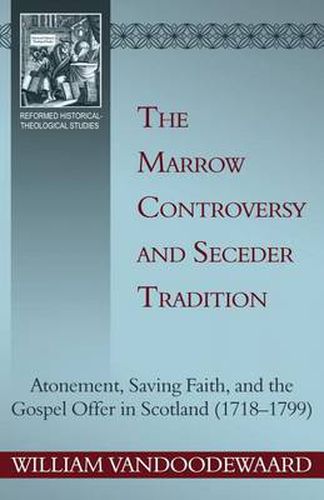Readings Newsletter
Become a Readings Member to make your shopping experience even easier.
Sign in or sign up for free!
You’re not far away from qualifying for FREE standard shipping within Australia
You’ve qualified for FREE standard shipping within Australia
The cart is loading…






After the Reformation, the Marrow Controversy of the eighteenth century is noted as one of the most significant and defining events in the Scottish church. However, until now, there has not been a serious analysis of the theology of the Marrow Men as it relates to churches in Scotland during the aftermath of the controversy.
In this important study, William vanDoodewaard identifies characteristic understandings of Marrow theology on the atonement, saving faith, and the free offer of the gospel and traces them out in the theology of the Seceder tradition. In doing so, he presents substantial evidence for the continuity of Marrow theology in the Associate Presbytery and Associate Synod in Scotland during the eighteenth century. He ably demonstrates that while Marrow theology was not the primary cause of the Secession churches, the Seceders were aware of the significance of Marrow theology and consciously made it an integral part of their churches.
Table of Contents:
Part 1: Views of the Gospel and Its Proclamation: The Era of the Marrow Controversy
Conclusions on the Doctrine of the Atonement, Saving Faith, and the Gospel Offer during the Marrow Controversy
Part 2: Views of the Gospel and Its Proclamation in the Associate Presbytery (1733-1747) and Associate Synod (1747-1799)
A Historical Introduction to the Secession Church
Historiographical Introduction to the Secession Churches
Theological Evidences for the Continuity of Marrow Theology in the Associate Presbytery (1733-1747)
The Associate Presbytery, George Whitefield, and the Cambuslang Revival
Theological Evidences for the Continuity of Marrow Theology in the Associate Synod: John Swanston to John Fraser (1748-1770)
$9.00 standard shipping within Australia
FREE standard shipping within Australia for orders over $100.00
Express & International shipping calculated at checkout
After the Reformation, the Marrow Controversy of the eighteenth century is noted as one of the most significant and defining events in the Scottish church. However, until now, there has not been a serious analysis of the theology of the Marrow Men as it relates to churches in Scotland during the aftermath of the controversy.
In this important study, William vanDoodewaard identifies characteristic understandings of Marrow theology on the atonement, saving faith, and the free offer of the gospel and traces them out in the theology of the Seceder tradition. In doing so, he presents substantial evidence for the continuity of Marrow theology in the Associate Presbytery and Associate Synod in Scotland during the eighteenth century. He ably demonstrates that while Marrow theology was not the primary cause of the Secession churches, the Seceders were aware of the significance of Marrow theology and consciously made it an integral part of their churches.
Table of Contents:
Part 1: Views of the Gospel and Its Proclamation: The Era of the Marrow Controversy
Conclusions on the Doctrine of the Atonement, Saving Faith, and the Gospel Offer during the Marrow Controversy
Part 2: Views of the Gospel and Its Proclamation in the Associate Presbytery (1733-1747) and Associate Synod (1747-1799)
A Historical Introduction to the Secession Church
Historiographical Introduction to the Secession Churches
Theological Evidences for the Continuity of Marrow Theology in the Associate Presbytery (1733-1747)
The Associate Presbytery, George Whitefield, and the Cambuslang Revival
Theological Evidences for the Continuity of Marrow Theology in the Associate Synod: John Swanston to John Fraser (1748-1770)